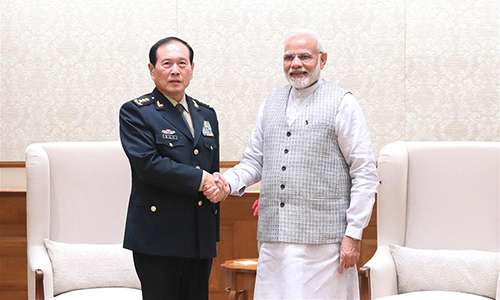
Indian Prime Minister Narendra Modi (R) shakes hands with visiting Chinese State Councilor and Defense Minister Wei Fenghe on August 21, 2018, in New Delhi, India. China and India pledged on Tuesday to further strengthen ties between the two countries and their militaries. (Photo: Xinhua)
The trilateral meeting of US President Donald Trump, Japanese Prime Minister Shinzo Abe and Indian Prime Minister Narendra Modi was symbolic and will not lead to an alliance against China as Western media reported, because of differences in their Indo-Pacific strategies.
Neither Japan nor India wants to damage their improving relations with China, but admittedly they also want to maintain good ties with the US, which wants to see China in trouble, Chinese experts said on Sunday.
The leaders from the three countries met on the sidelines of the G20 summit in Buenos Aires on Friday, where they agreed to cooperate on maritime security in the Indo-Pacific region, Japan's Kyodo News Agency reported on Saturday.
"The three of us working together will bring more prosperity and stability to the region and the world," Indian Express quoted Abe as saying on Sunday.
Qian Feng, a research fellow at Tsinghua University's National Strategy Institute, told the Global Times on Sunday that the meeting is more of a symbolic move of the US to manifest that its Indo-Pacific strategy is smoothly moving forward.
Western media called the meeting "a show of unity with China clearly in mind."
Qian said that while China needs to stay vigilant over activities that may harm its interests, it is too soon to conclude that Japan and India will join the US in dealing with China.
However, the three countries have different agendas in the Indo-Pacific, Qian said.
According to the Daily Star, Modi and Abe also held separate meetings with Chinese President Xi Jinping.
Japan and India are moving toward restoring their relations with China, and it doesn't do any good for them to openly risk damaging ties, Qian said.
Abe said during his visit to China in October that Japan welcomes and supports China to further expand its opening-up to the outside world and is willing to continue to participate in China's development process, China Central Television reported.
Likewise, Modi said at a keynote address at the Shangri La Dialogue in Singapore in June that India does not see the Indo-Pacific region as a grouping that seeks to dominate, nor does the country consider it as directed against any country, Indian Express reported.


